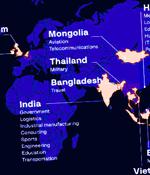Security News

Three US national security agencies - CISA, the FBI and the NSA - on Thursday issued a joint advisory naming the 20 infosec exploited by state-sponsored Chinese threat actors since 2020. The Cybersecurity and Infrastructure Security Agency, National Security Agency and Federal Bureau of Investigation stated they collectively consider the People's Republic of China state-sponsored cyber activities as "Being one of the largest and most dynamic threats to U.S. government and civilian networks."

China appears to have upgraded its Great Firewall, the instrument of pervasive real-time censorship it uses to ensure that ideas its government doesn't like don't reach China's citizens. Great Firewall Report, an organization that monitors and reports on China's censorship efforts, has this week posted a pair of assessments indicating a crackdown on TLS encryption-based tools used to evade the Firewall.

Meta Platforms on Tuesday disclosed it took steps to dismantle two covert influence operations originating from China and Russia for engaging in coordinated inauthentic behavior so as to manipulate public debate. The sophisticated Russian activity, which commenced in May 2022, impersonated mainstream European news outlets like Der Spiegel, The Guardian, and Bild, not to mention build credibility by creating fake accounts across several platforms to amplify pro-Russian narratives.

The Council explored the state of Chinese infosec research in the context of the 2021 introduction of "Regulations on the Management of Security Vulnerabilities of Network Products" that require local researchers to report any vulns they find to local authorities. A ban on Chinese researchers participating in international infosec competitions is thought to have been imposed for similar reasons.

The Biden-nominated chief of space operations for the USA's Space Force rates China his greatest challenge, as the Middle Kingdom has developed technologies to destroy space assets. "The most immediate threat, in my opinion, is the pace with which our strategic challengers - first and foremost the Chinese - are aggressively pursuing capabilities that can disrupt, degrade and ultimately even destroy our satellite capabilities and disrupt our ground infrastructure," Space Force Lieutenant General B. Chance Saltzman said during a nomination hearing before the Senate Armed Services Committee earlier this week.

China has accused the U.S. National Security Agency of conducting a string of cyberattacks aimed at aeronautical and military research-oriented Northwestern Polytechnical University in the city of Xi'an in June 2022. The National Computer Virus Emergency Response Centre disclosed its findings last week, and accused the Office of Tailored Access Operations at the USA's National Security Agency of orchestrating thousands of attacks against the entities located within the country.

It's said that the pair promoted the idea at a conference in 2018 and a few news outlets picked up on that plan and suggested Rongelap could become "The new Hong Kong.". In a May 2021 publication [PDF] the IMF noted the proposal to create a digital economic zone on Rongelap and characterized it as "Envisioned to focus on virtual means of exchange, including virtual assets."

China will conduct a three month blitz to cleanse the local internet of "Rumors and false information". The nation's Cyberspace Administration last Friday announced the plan, which calls for local tech companies to improve their ability to identify the source of rumors and fake news, then punish account-holders who share it with warnings, bans, and permanent suspensions.

The campaign, active from April to June of this year, targeted Australian government agencies, Australian media companies and manufacturers who conduct maintenance on wind turbine fleets in the South China Sea. According to the researchers, victims were sent phishing emails that directed them to faked versions of Australian news outlets The Herald Sun and The Australian.

The Chinese advanced persistent threat actor tracked as Winnti has targeted at least 13 organizations geographically spanning across the U.S, Taiwan, India, Vietnam, and China against the backdrop of four different campaigns in 2021. APT41, also known as Barium, Bronze Atlas, Double Dragon, Wicked Panda, or Winnti, is a prolific Chinese cyber threat group that's known to carry out state-sponsored espionage activity in parallel with financially motivated operations at least since 2007.